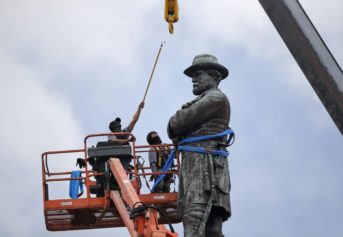
Baltimore Mayor Catherine Pugh said the city would follow in the footsteps of New Orleans and make efforts to take down Confederate monuments. (Photo by Chip Somodevilla/Getty Images)
Taking a cue from New Orleans, Baltimore Mayor Catherine Pugh said she’s looking to rid the city of its Confederate war monuments. Meanwhile, a small city outside Louisville, Ky., happily welcomed a controversial war statue Monday, May 29.
“The city does want to remove these,” Pugh told The Baltimore Sun last week. “We will take a closer look at how we go about following in the footsteps of New Orleans.”
The mayor’s announcement came just days after New Orleans officials removed the statue of Confederate Gen. Robert E. Lee, the last of four monuments ordered to be taken down by Mayor Mitch Landrieu. Removal of the monuments was met with intense backlash, as Confederate apologists and opposing demonstrators clashed in the streets.
Baltimore’s initial efforts to take down the Confederate monuments were launched by Pugh’s predecessor, Stephanie Rawlings-Blake, who ordered a review of the Civil War tributes and inquired into having them removed. Before leaving office last year, Rawlings-Blake even put up signs in front of four Confederate monuments, labeling the statues “part of a propaganda campaign of national pro-Confederate organizations [that] perpetuate the beliefs of white supremacy, falsify history and support segregation and racial intimidation.”
The former mayor stopped short of removing the monuments, however, citing costs and logistical funds, according to The Baltimore Sun. The decision was then left to Pugh, who took office in December.
While Baltimore is looking to get rid of its Confederate monuments, the town of Brandenburg, Ky., celebrated Memorial Day by rededicating a Confederate statue that was removed from the University of Louisville’s campus, according to Reuters. Like many Confederate monuments, the statue was a bitter reminder of the institution of slavery and white supremacy for many.
Brandenburg Mayor Ronnie Joyner doesn’t see it that way, however.
“The way I look at it, it’s part of our history,” Joyner said at the dedication, where close to 400 people gathered for the ceremony, some of them dressed in grey replica uniforms. “We need to preserve our history.”
The 70-foot-tall concrete structure, which is now situated near the spot where a Confederate general launched a raid on neighboring state Indiana in 1863, features a gargantuan statue of a rebel soldier at the top. Joyner said he hoped the new statue would bring more tourists to the area.
Meanwhile, back in Baltimore, Pugh said she wants to turn her attention to the monuments, even though her first few months in office have primarily been focused on police reform and boosting funds for the city’s school system.
“You name it, we’ve tackled it,” she told the newspaper. “This is another one of those things that we will tackle as well.”
Carolyn Billups, a former president of Maryland’s chapter of the United Daughters of the Confederacy, pushed back against the mayor’s efforts, however, arguing that the city had more costly and urgent issues to address.
“I find it interesting that Baltimore city has that kind of money to move statues when there are problems with crime and schools,” Billups said. “I would think that would be more of a priority.”
The city’s Confederate Women’s monument, the Roger B. Taney monument on Mount Vernon Place and the Robert E. Lee and Thomas. J. “Stonewall” Jackson monuments in Wyman Park Dell were among those reviewed by the commission under Rawlings-Blake, according to The Baltimore Sun.
The commission suggested removing the Taney and Lee and Jackson statues, while adding signs to the others.


